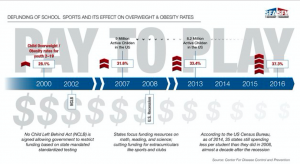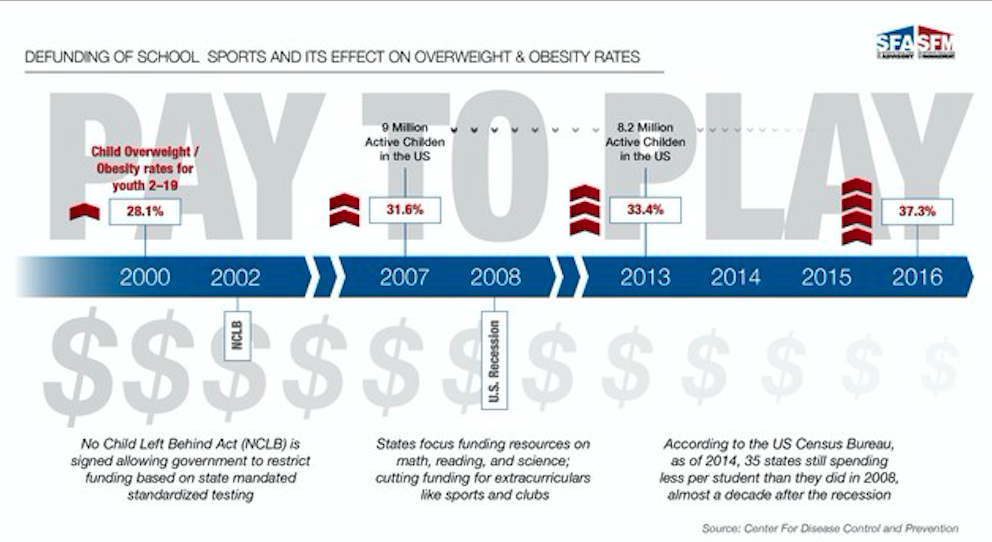The Aspen Institute Project Play Summit, designed to address the cost barriers kids from lower income households increasingly face participating in youth sports, will be held in Washington, D.C. on October 16.
Dev Pathik, a youth sports thought leader and the founder and CEO of the Sports Facilities Advisory and co-founder of Sports Facilities Management, said in a statement the issue is an economic and social crisis that requires attention. Pathik said, “Public officials are unaware of the correlation between reduced physical education in schools, parks and recreation budget cuts and the rise in childhood obesity levels.”
Pathik referenced a timeline his research team built that illustrates this connection.
“Changing the model starts with a fundamental understanding that the problem at hand is not simply a youth sports problem, but a serious nationwide epidemic that has long term health implications (and costs) for communities and our society as a whole,” said Pathik. “We have to find ways to get kids engaged in physical activity levels that can reverse this terrifying trend. If we do not, the long-term health care costs, social impacts and other consequences will negatively impact future generations.”
“No one organization alone can build healthy kids and communities through sports. It will take like-minded groups, even competitors, collaborating to get kids off the couch,” said Tom Farrey, executive director of the Aspen Institute’s Sports & Society Program.
Farrey heads up the Aspen Institute’s Project Play Initiative, a program that is leading the way when it comes to promoting inclusion and growing sports participation rates in America. The initiative is supported by some of the U.S.’s most iconic brands, leagues and organizations, all of whom will be represented at the 2018 Summit that will be held in Washington, D.C. next week.
Pathik said, “SFA is collaborating with numerous stakeholders in communities across America to provide practical funding solutions that support access to sport. With over 50 million visits in our facilities in the past three years, we have developed a number of proven partnership models that could be employed in communities across the U.S.
This is not just about public policy; it is about public-private partnerships and innovative approaches that include bringing public and private sector parties together to solve these issues. It requires getting the right stakeholders to the table, helping them identify ‘what’s in it for them’ and the integration of medical, corporate and public sector stakeholders.”
Pathik said that with over 30 percent childhood obesity rates, we are looking at a generation that will suffer from a lifetime of health and social consequences. This is unnecessary, because there are already funding mechanisms and partnerships that can be employed and others that are on the horizon.
 SFA and SFM are founding members of the The Aspen Institute Project Play 2020 Initiative. This 20-member group has gathered under the leadership of the Aspen Institute Project Play to develop solutions to the most significant issues in youth sports and access to sport for all.
SFA and SFM are founding members of the The Aspen Institute Project Play 2020 Initiative. This 20-member group has gathered under the leadership of the Aspen Institute Project Play to develop solutions to the most significant issues in youth sports and access to sport for all.
Sports Facilities Management LLC (SFM) and Sports Facilities Advisory LLC (SFA) are both headquartered in Clearwater, FL. SFA, founded in 2003, has produced more than $10 billion in institutional-grade financial forecasts for youth and amateur sports complexes, while SFM provides industry-leading, results-driven management solutions for sports, fitness, recreation and event venues nationwide. Since 2015, SFM-managed venues have hosted more than 50 million visitors and generated millions of dollars in economic impact. For more information, visit sportadvisory.com.















